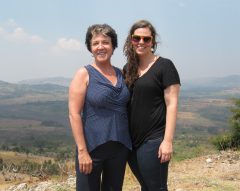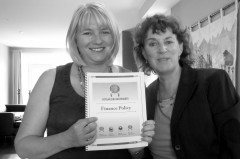Two Carleton graduate students spent three weeks in Burundi evaluating water and sanitation projects being managed by UNICEF Burundi.
This project was part of their coursework for Carleton’s Grad Diploma in Public Policy and Program Evaluation (DPE).
The students were reviewing the impact of a water system that had been installed in two of eight villages that were set up for repatriated Burundians refugees from Tanzania and the Congo.
 Lucie Goulet, the student project leader, said: “We are still in the process of analyzing our data but I can tell you that the water system is making a huge impact in peoples’ lives. Before this system was built, women and children would have to walk up to five kilometres one way to get clean water. They didn’t have carts or donkeys so this was a pretty difficult task. Now their access to water is much easier, time saving and physically less draining. In addition, we found out that repatriated people settled in new villages and people who lived nearby tend to congregate around water points so the system is creating a sense of community and solidarity among both groups.”
Lucie Goulet, the student project leader, said: “We are still in the process of analyzing our data but I can tell you that the water system is making a huge impact in peoples’ lives. Before this system was built, women and children would have to walk up to five kilometres one way to get clean water. They didn’t have carts or donkeys so this was a pretty difficult task. Now their access to water is much easier, time saving and physically less draining. In addition, we found out that repatriated people settled in new villages and people who lived nearby tend to congregate around water points so the system is creating a sense of community and solidarity among both groups.”
Goulet and her team-mate Julie Rodier were chosen by the DPE program for this particular project. The partnership between the DPE and Unicef Burundi came about when a Unicef representative attended Carleton’s IPDET program, which every summer, trains people from around the world on how to better evaluate their programs.
Says Goulet: “What I appreciate most about the grad diploma program is how we are able to focus on a real-life situation through implementing an evaluation. This allowed us to develop the different steps involved in the process throughout various DPE courses. For example, in one course we developed the Request for Proposal (RFP) for the Burundi project, then designed an evaluation plan; in another course we focused on methodologies and on data collection. It is a co-ordinated approach.”
 Two other DPE students are doing a project with the Kitigan Zibi Anishinabeg (KZA) First Nation, which is located near Maniwaki, Quebec. The students, Carol Miller and Anne Lipman, are evaluating a five-year funding agreement between the band and Aboriginal Affairs and Northern Development to assess the effectiveness of this agreement on the delivery of programs that meet the needs of the KZA community.
Two other DPE students are doing a project with the Kitigan Zibi Anishinabeg (KZA) First Nation, which is located near Maniwaki, Quebec. The students, Carol Miller and Anne Lipman, are evaluating a five-year funding agreement between the band and Aboriginal Affairs and Northern Development to assess the effectiveness of this agreement on the delivery of programs that meet the needs of the KZA community.
“We feel the KZA is extremely generous in allowing us, as students, to put their agreement under a microscope,” says Miller. “It’s a fortuitous time to be doing this considering all of the press around accountability issues.”
The students are using an approach influenced by a “utilization-focused evaluation” which allows them to engage the KZA in the overall evaluation process.
Chief of the KZA, Gilbert Whiteduck, says: “We view this as a tremendous opportunity to work with Carleton University grad students. This unique and positive working relationship will assist KZA in having a better understanding of our five-year funding agreement.”
The DPE is geared at working professionals who want to increase their knowledge about program evaluation so they can evaluate their own programs and find more relevant, efficient and cost-effective ways to measure their effectiveness. The program accepts 20 students per year and provides specialized courses and instructors in the field of evaluation.
 Robert Shepherd, the graduate faculty member responsible for the DPE, says Carleton is the natural home for this program. “Our faculty members have renowned expertise in this field and continue to deliver the highly successful IPDET program. As well, the School is located in Ottawa, allowing our participants to take advantage of a wide network on evaluation professionals.” Canada is also home to the only evaluation credential in the world – the Credentialed Evaluator (CE).
Robert Shepherd, the graduate faculty member responsible for the DPE, says Carleton is the natural home for this program. “Our faculty members have renowned expertise in this field and continue to deliver the highly successful IPDET program. As well, the School is located in Ottawa, allowing our participants to take advantage of a wide network on evaluation professionals.” Canada is also home to the only evaluation credential in the world – the Credentialed Evaluator (CE).
Friday, September 20, 2013 in News, Programs
Share: Twitter, Facebook





